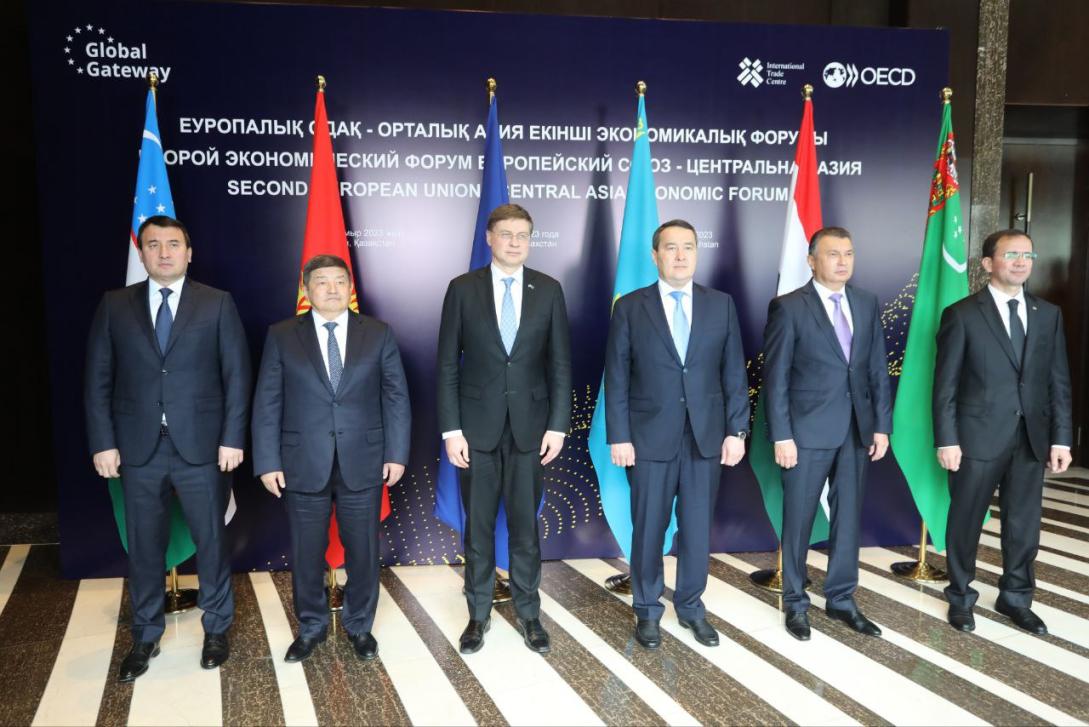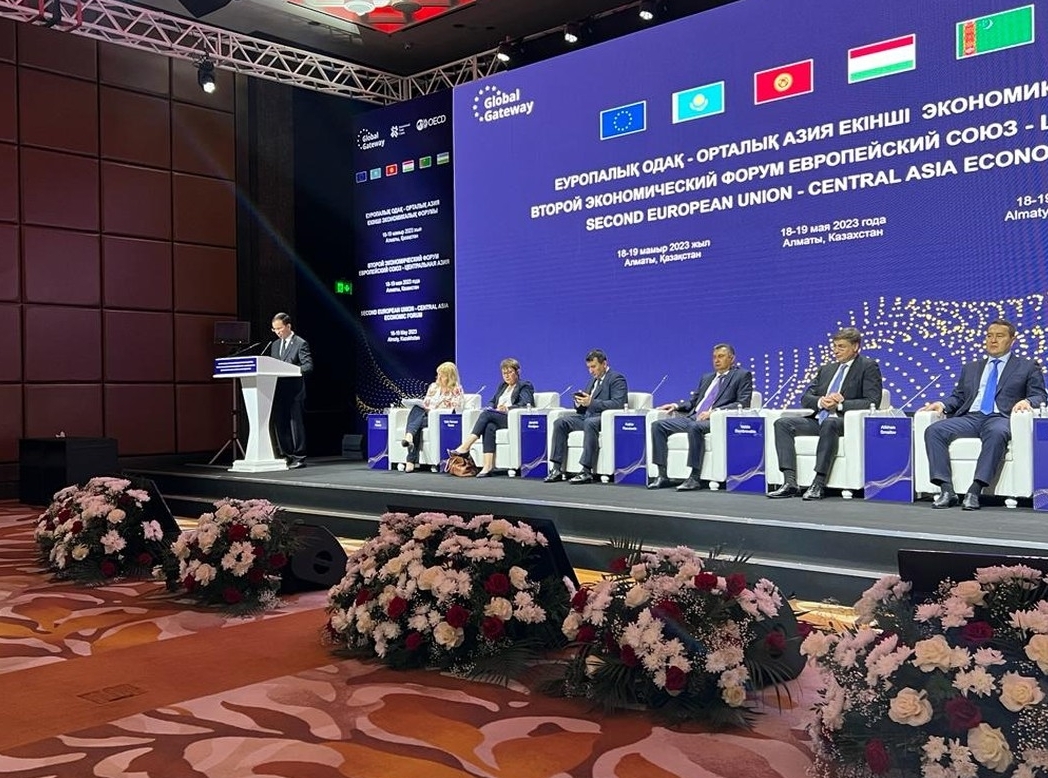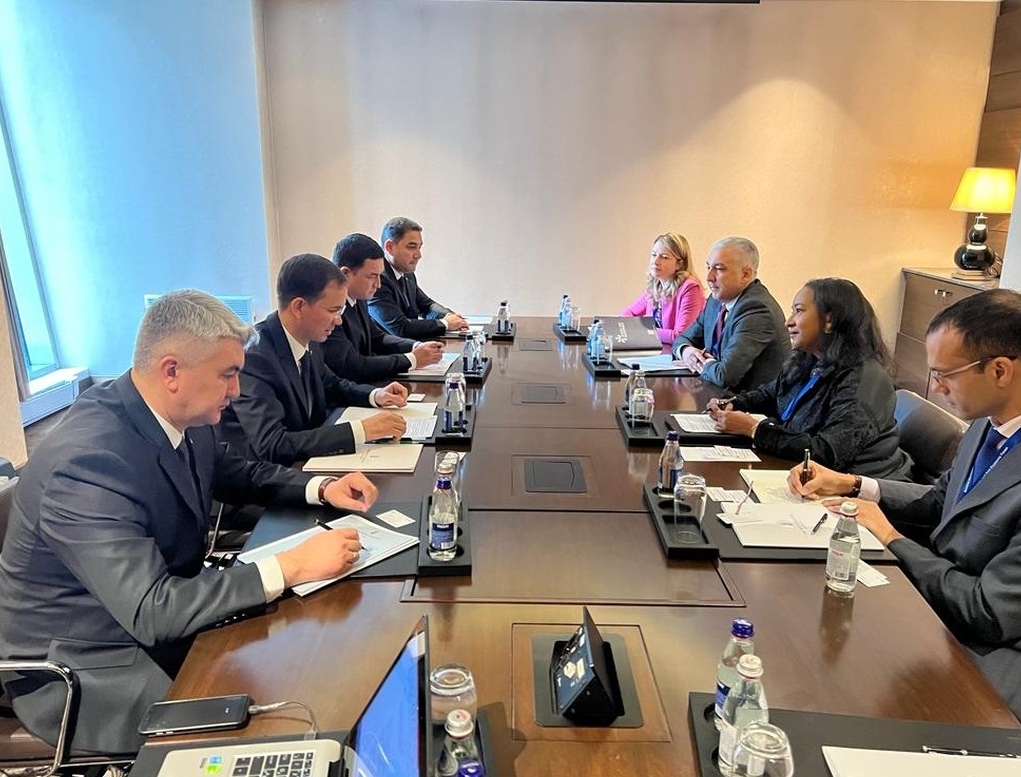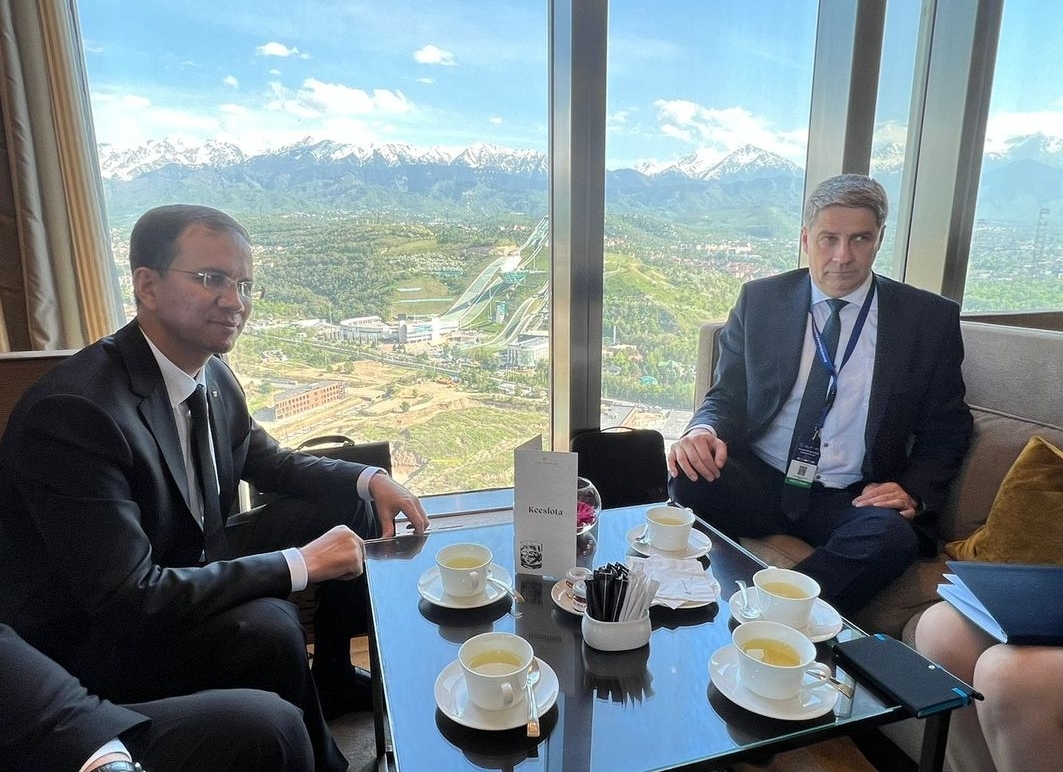
On 19 May 2023, a high-level plenary session on strengthening trade and economic relations between the European Union and Central Asia was held within the framework of the 2nd EU-Central Asia Economic Forum in Almaty, the Embassy of Turkmenistan in Kazakhstan reports.
The purpose of the High-level Forum is to promote cooperation between EU and Central Asian countries in key areas such as green and digital transition, improving the business environment, as well as trade and connectivity opportunities, taking into account existing EU initiatives and strategies developed by the Governments of Central Asian countries. Following the results of the forum, a Joint Statement was issued (see below).
The forum was attended by:
- Kazakhstan – Prime Minister Alikhan Smailov
- Kyrgyzstan – Prime Minister Akylbek Zhaparov
- Uzbekistan – Deputy Prime Minister Jamshid Khojayev
- Tajikistan – Kohir Rasulzada
- Turkmenistan – Minister of Finance and Economy Serdar Jorayev
- Head of the European Bank for Reconstruction and Development Odile Renaud-Basso,
- Vice President of the European Investment Bank Teresa Chervinskaya
- heads of a number of international financial organizations.
The delegation of Turkmenistan headed by the Minister of Finance and Economy of Turkmenistan, Mr. Serdar Jorayev, took an active part in this event and delivered a keynote speech at the opening of the Forum.
As part of the participation in the forum, Serdar Jorayev also held separate meetings with the Executive Vice-President of the European Commission Valdis Dombrovsky, Vice-Chancellor of the Ministry of Foreign Affairs of Estonia for Global Affairs Myart Vollmer and Executive Director of the International Trade Center Pamela Coke-Hamilton.
During the conversation with European partners, the current state and potential for expanding cooperation were discussed, in particular, in such areas as transport, infrastructure, green energy, agriculture, cooperation in the oil and gas industry, as well as issues of attracting foreign investment in strategically important sectors of the economy of Turkmenistan.
Joint Press Statement: 2nd EU-Central Asia Economic Forum
On the occasion of the second in-person European Union-Central Asia Economic Forum, which took place in Almaty, Kazakhstan on 18 and 19 May 2023, the EU and Central Asia welcomed the enhanced strategic importance, relevance and intensity of EU-Central Asian relations. The parties reaffirmed their joint and steady commitment to further developing their strong, multi-faceted and forward-looking partnership, based on shared values and mutual interests. The participants reviewed the implementation of three priority areas of the First in-person EU-Central Asia Economic Forum, which took place in Bishkek, Kyrgyzstan, on 5 November 2021 and stressed their intention to keep working together towards the continued transformation of Central Asian economies, with particular focus on better business environment, green and digital transitions, and EU-Central Asia trade and economic relations. In line with the EU Strategy for Central Asia and following the launch of the EU Global Gateway in 2021, the EU’s offer to promote smart investments in quality infrastructure respecting the highest social and environmental standards– the parties agreed that sustainable and trust-based connectivity supports the shared goal of a prosperous and secure Central Asia.
To that end, the parties:
- Welcomed the continued geopolitical and strategic relevance of the Forum as a regional platform for economic dialogue between the EU and Central Asia.
- Noted that the Forum facilitates closer economic relations and promotes inclusive and sustainable development through further diversification of the Central Asian and EU economies, boosting intra and interregional trade, enhancing the rule of law and strengthening regulatory frameworks.
- Expressed their continued commitment to uphold the UN Charter and principles of international law, particularly the respect for the independence, sovereignty and territorial integrity of all UN Member states.
- Agreed that cooperation should focus, among other things, on promoting environmental and social sustainability, removing trade barriers and promoting inclusiveness, enhancing competitiveness, creating jobs, accelerating integration into regional and global markets, and ensuring a level playing field for businesses. The business-to-business component of the Forum was particularly welcomed in promoting EU-Central Asia business, trade and investment relations.
On building a safe and attractive business and investment environment, the parties:
- Discussed EU-supported studies prepared by the OECD on the business climate and they also welcomed progress achieved in Central Asia in the improvement thereof.
- Noted the importance of maintaining focus on delivering ambitious reforms, in close consultation with the business community and civil society, towards the modernisation of Central Asian economies and improvement of their integration into global markets, including the EU, through ensuring conformity with the highest levels of international norms and standards, especially in the areas of taxation, legal certainty, and minimisation of red tape.
- Welcomed the contribution that EU-Central Asia cooperation can make to the prosperity of the region, also through the Enhanced Partnership and Cooperation Agreements which can materially support the delivery of high-quality reforms.
- Took note of the EU’s plans regarding its forthcoming prosperity programme to continue enhancing competitiveness, business environment, as well as international and intra-regional trade in Central Asia.
- Recognised the importance of innovative tools to attract private investment, and therefore welcomed the announcement of new EU guarantee schemes for investment and private sector development under the European Fund for Sustainable Development.
- Welcomed the announced intention by the European Investment Bank to increase its presence in the region, which will allow stepping up EU activities and investment in Central Asia, which will forge improved cooperation on the ground and provide further impetus to sustainable connectivity and the transition towards a sustainable, climate-neutral growth model in line with the EU’s Global Gateway priorities.
On green and digital transitions, the parties:
- Fully acknowledging the effects of climate change in Central Asia, recognised in particular the need to develop and adopt policies that ensure transition to a net-zero-emissions economy, including through investment in renewable energy sources and by developing intra-regional trade in sustainably generated electricity.
- Expressed continued support to the Regional Team Europe Initiative on Water, Energy and Climate Change that aims to support the efforts of Central Asian partners to harness the full potential of solar, wind and hydropower energy.
- Stressed the importance of joint work on climate change, sustainable water management and preservation of biodiversity, including projects to combat environmental risks in Central Asia, as well as the consequences of the loss of water of the Aral Sea.
- Called for broader dialogue between Central Asia and the EU contributing to water and energy security at national and regional levels, to ensure the stability and sustainability of regional energy markets and to mutually support economic growth, including through the development of alternative energy supply routes. The importance of joint regional programmes in this field was stressed.
- Welcomed the EU’s intention under the Team Europe Initiative on Digital Connectivity to work towards reducing digital divides and ensuring high bandwidth through the introduction of satellite communication channels and discussed how to enhance cooperation in this regard.
- Recognised the need to develop and adopt measures that facilitate technological exchange between regions, primarily in the areas of digitalisation with both soft and hard measures to support these processes.
On enhancing trade and connectivity, the parties:
- Acknowledged the interest in the further facilitation of trade relations between the EU and Central Asia, as well as the interest of those Central Asian states qualifying for GSP to continue to benefit from GSP or GSP+ preferences that give preferential access to the EU market, facilitate EU-Central Asia trade, and incentivise sustainable development and good governance.
- Agreed to explore the possibility of cooperation on critical raw materials.
- Recognised the need for in-depth joint work of governments within the framework of the EU strategic Global Gateway on the development of smart, clean, and safe interconnection.
- Stressed the importance of developing the transport and transit potential of the Central Asia region and welcomed the presentation of the key findings of the EU-financed Study on Sustainable Transport Corridors between Europe and Central Asia carried out by the European Bank for Reconstruction and Development. This suggests ways to ensure policy actions to improve existing infrastructure and the regulatory environment and looked forward to the publication of the Study’s final report in June to review it in detail.
- Called for further reform of internal transport corridors in Central Asia to build a fundamentally new architecture of transport flows in a regional format and noted the priority of agreeing on a roadmap for attracting investment in the development of transport infrastructure in Central Asia with the active involvement of the financial potential of European public and private partners.
The parties agreed to regularly take stock of the progress made in the identified priority areas and looked forward to the organisation of the next EU-Central Asia Forum in 2025. ///nCa, 19 May 2023 [photo credit – Embassy of Turkmenistan to Kazakhstan, EU Delegation in Kazakhstan]


